8 sustainable packaging hits of 2017
Projects by Coca-Cola, McCormick and Procter & Gamble led our top sustainable packaging articles of the year, with some of the highest page views of all stories posted this year on PackagingDigest.com.
And three out of our list of eight articles were published more than a year ago—proving the staying power of great ideas.
Follow us down a rewarding path of sustainable packaging achievements and new ideas, starting with a company that has 23 billion-dollar brands…
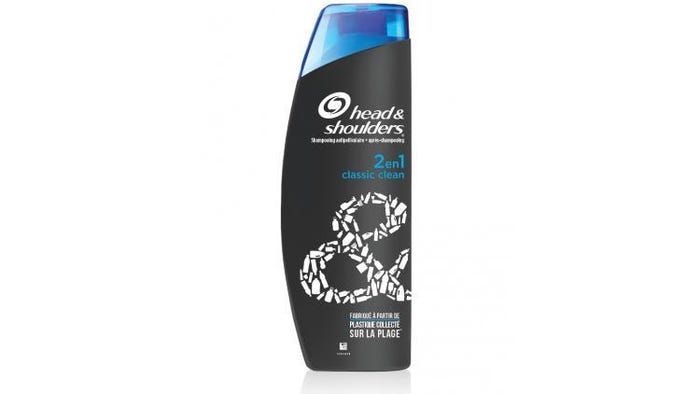
#8. First fully recyclable shampoo bottle made with beach plastic points to new plastics economy
Procter & Gamble put its might behind fighting the marine debris problem with a project to reuse plastics collected from beaches.
P&G partnered with TerraCycle and Suez, the largest waste management company in Europe, “to source, develop and put out the first fully recyclable shampoo bottle made from up to 25% beach plastic for the world’s #1 shampoo brand, Head & Shoulders,” says Tom Szaky, TerraCycle’s founder/CEO and article author.
In this piece, Szaky also introduced our audience to the New Plastics Economy, a movement that challenges organizations to “move away from the existing linear, take-make-dispose economy” and rethink/redesign plastic packaging by applying the regenerative principles of the circular economy.
NEXT: McCormick spices up the sustainability of its packaging
******************************************************************************
Did you know? Our parent company UBM owns these popular packaging events: WestPack, EastPack, PackEx Toronto and PackEx Montreal. Click the links to learn how you can connect in person with leading packaging technology partners, expand your professional network, hear experts analyze key packaging trends and gain a better understanding of today's critical issues.
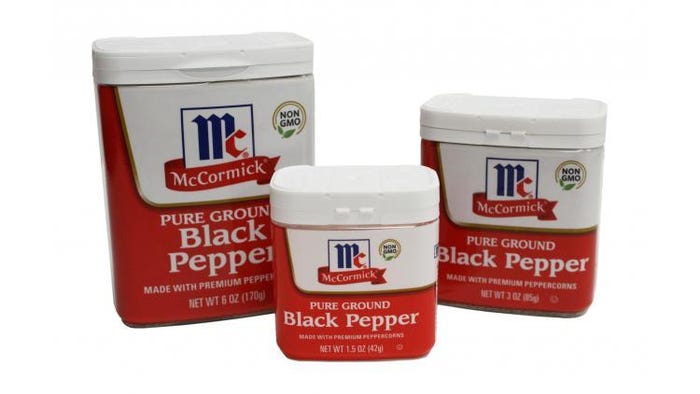
#7. McCormick’s recipe for packaging that’s more sustainable
In a career rife with packaging innovations—including the highly acclaimed dual-function Heinz Dip & Squeeze ketchup package—Michael Okoroafor sets a high bar. Now, as vp, global sustainability & packaging innovation at McCormick & Co., he gives senior technical editor Rick Lingle an exclusive interview to outline how the company plans to achieve its carbon reduction goals.
McCormick & Co. has already made good progress. Okoroafor cites three recent projects and measures their impact.
Along the way, his most important and significant learning has been that “sustainable packaging often provides the best financial choice” among innovative options, despite the common belief that sustainable packaging is generally more costly.
NEXT: Recyclable pouches? Really?
******************************************************************************
Did you know? Our parent company UBM owns these popular packaging events: WestPack, EastPack, PackEx Toronto and PackEx Montreal. Click the links to learn how you can connect in person with leading packaging technology partners, expand your professional network, hear experts analyze key packaging trends and gain a better understanding of today's critical issues.
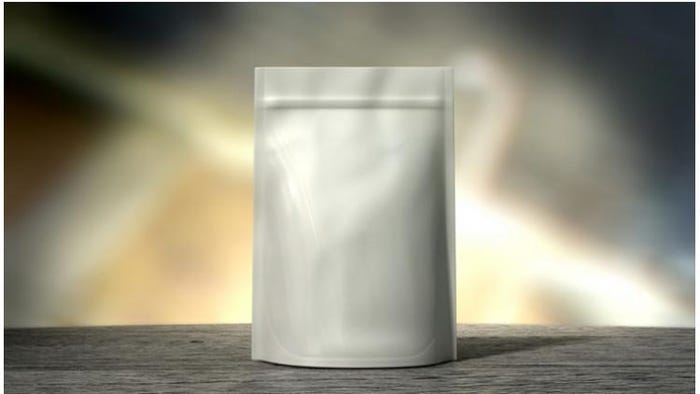
#6. Is 100% recyclable flexible packaging possible?
Sure, the idea of recycling pouches, bags and other types of flexible packaging is well accepted now that Seventh Generation, Dow and others have made inroads. But back in August 2014 when professional plastics manufacturing and packaging blogger Ashley Swinehart first proposed the concept, it got people thinking about alternate end-of-life scenarios for flexible packaging, the second largest packaging segment in the United States.
NEXT: Just how important is sustainable packaging?
******************************************************************************
Did you know? Our parent company UBM owns these popular packaging events: WestPack, EastPack, PackEx Toronto and PackEx Montreal. Click the links to learn how you can connect in person with leading packaging technology partners, expand your professional network, hear experts analyze key packaging trends and gain a better understanding of today's critical issues.
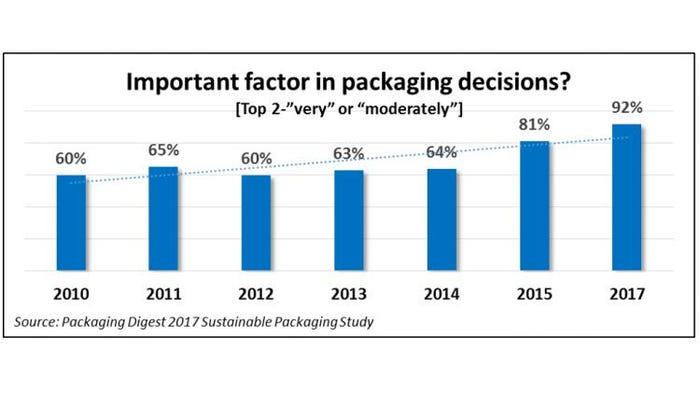
#5. Sustainable packaging is more important than ever
Sustainability has grown in importance over the last 10 years, according to respondents to Packaging Digest’s Sustainable Packaging Study. In 2017, 92% say sustainability is a very or moderately important factor when designing or choosing new packaging.
This short article reveals three key highlights from our annual survey—done in partnership with the Sustainable Packaging Coalition—and invites readers to download the free 34-page report of the full study results.
Additional insights from SPC’s associate director Adam Gendell were presented in a webinar, which you can view on-demand.
NEXT: Coca-Cola’s sustainable strategy
******************************************************************************
Did you know? Our parent company UBM owns these popular packaging events: WestPack, EastPack, PackEx Toronto and PackEx Montreal. Click the links to learn how you can connect in person with leading packaging technology partners, expand your professional network, hear experts analyze key packaging trends and gain a better understanding of today's critical issues.
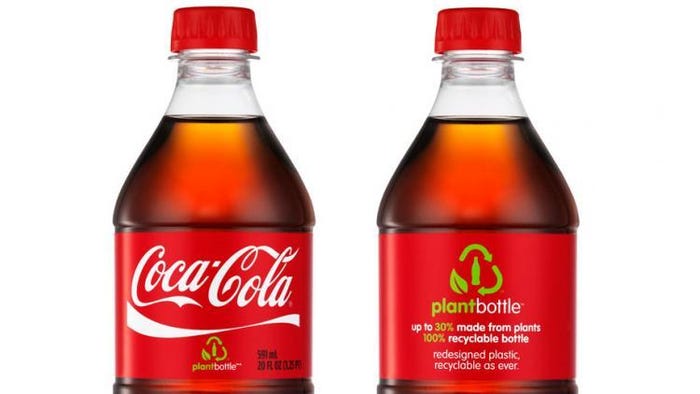
#4. Ahh…Coke refreshes its sustainable packaging strategy
Ever wonder what makes Coca-Cola’s partnerships with sustainable packaging technology suppliers so powerful and successful? I did. So I asked the beverage giant’s sustainable packaging lead Sarah Dearman. She told me and I, in turn, told you.
In this article, Dearman—who spoke at SustPack 2017 about the role sourcing plays in Coca-Cola’s new Sustainable Packaging Strategy and about further PlantBottle developments—also discusses the need for collaboration to advance sustainable packaging technologies, the challenges of meeting consumer expectations and thriving in The New Plastics Economy.
All this and more will help Coca-Cola meet its goal of reducing the carbon footprint of its packaging.
NEXT: Would you like a refill?
******************************************************************************
Did you know? Our parent company UBM owns these popular packaging events: WestPack, EastPack, PackEx Toronto and PackEx Montreal. Click the links to learn how you can connect in person with leading packaging technology partners, expand your professional network, hear experts analyze key packaging trends and gain a better understanding of today's critical issues.
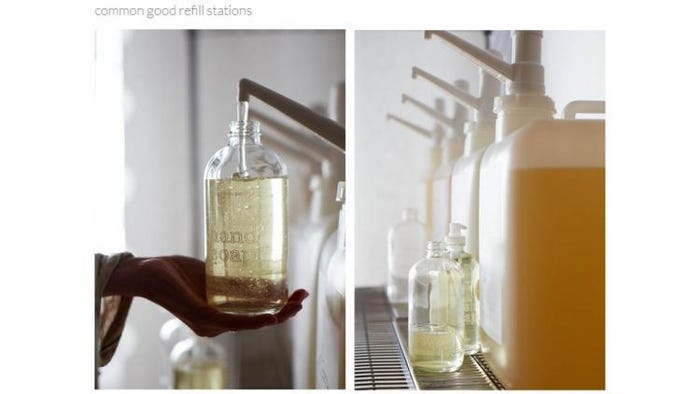
#3. Are refill stations the answer to packaging waste?
In olden days, the milkman would pick up your empty bottles and refill them. Today, many beer drinkers refill growlers with their favorite craft brews. And while refillable packaging is not something the majority of people would want, it is still an eco-option.
TerraCycle founder/CEO Tom Szaky (remember him from the #8 article on this list?) says Americans can cut packaging waste by reusing the containers we already have at refilling stations. In this April 2015 article, he mentions a couple stores—one on the west coast and one on the east coast—that cater to the BYO (bring your own) refillable container concept.
And have you heard of Replenish, the innovative refill pod that mates to a reusable container? Or the smartphone app Bulk that helps you locate stores where you can buy products and take them home in your own container?
All Szaky is saying is, give refills a chance.
NEXT: Not all bioplastics are the same.
******************************************************************************
Did you know? Our parent company UBM owns these popular packaging events: WestPack, EastPack, PackEx Toronto and PackEx Montreal. Click the links to learn how you can connect in person with leading packaging technology partners, expand your professional network, hear experts analyze key packaging trends and gain a better understanding of today's critical issues.
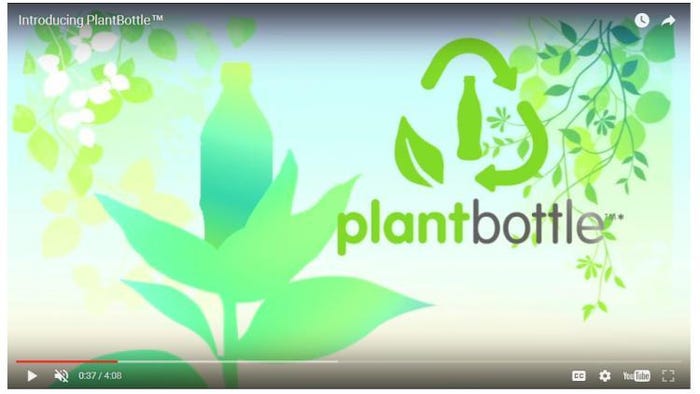
#2. How sustainable are biodegradable and plant-based plastics?
Bioplastics are big business these days and come in two main categories. In this third Szaky-authored article in our list, he argues for the “durable” rather than “biodegradable” kind. Not sure what the difference is? Not to worry. Szaky defines them:
Durable bioplastics are “made from plant materials, but can still be recycled.”
Biodegradable bioplastics are “exactly as they sound: in theory, they break down naturally in the environment or may be composted.”
To make durable bioplastics as viable as possible, Szaky recommends, “We will need to start curbing the demand for plastics overall. With less demand, the market will be in a far better place to meet demand with more contained impacts to the environment.”
NEXT: New sustainable packaging materials?! Uh-huh.
******************************************************************************
Did you know? Our parent company UBM owns these popular packaging events: WestPack, EastPack, PackEx Toronto and PackEx Montreal. Click the links to learn how you can connect in person with leading packaging technology partners, expand your professional network, hear experts analyze key packaging trends and gain a better understanding of today's critical issues.
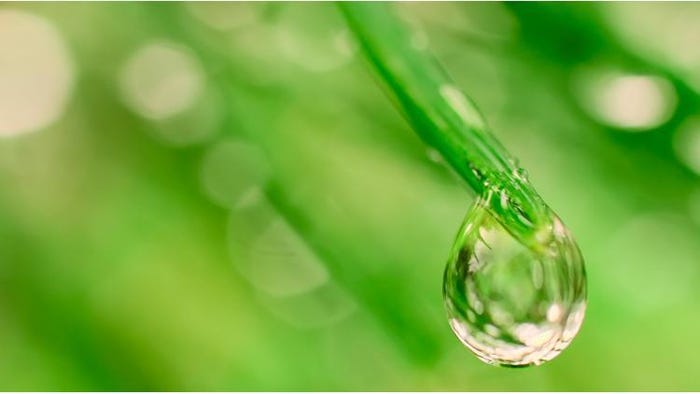
#1. 5 exciting, emerging sustainable packaging materials to watch in 2016
Hmmm…think there’s a burning desire for information about new packaging materials that are sustainable? THERE IS. We posted this article in February 2016 but it vaulted to our #1 spot this year—by almost double the number of page views as our #2 article in this list.
Part of the reason this is such a popular article is that some of the technologies are still emerging. The five packaging material developments that author Shane Bertsch, vp of innovation at HAVI Global Solutions (HGS), found most promising are:
1. Sustainable Aqueous Barrier Coatings
2. Molded Fiber Printing
3. Light Weight Insulation
4. Micro-Fibrillated Cellulose (MFC) Specialty Fiber
5. Micro-Pattern Material Enhancement
Which ones tickle your fancy?
******************************************************************************
Did you know? Our parent company UBM owns these popular packaging events: WestPack, EastPack, PackEx Toronto and PackEx Montreal. Click the links to learn how you can connect in person with leading packaging technology partners, expand your professional network, hear experts analyze key packaging trends and gain a better understanding of today's critical issues.
About the Author(s)
You May Also Like




